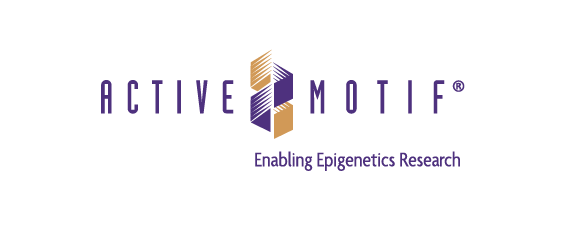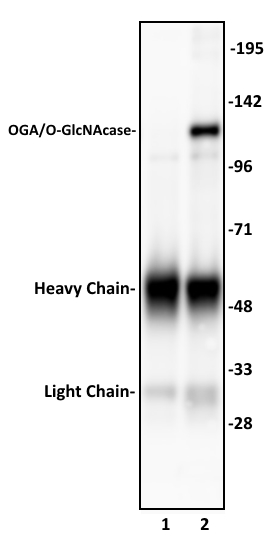OGA/O-GlcNAcase antibody (pAb)
Host / Isotype
Rabbit / IgG
Reactivity
Human
Applications
IP, WB
Cat No : 61425,61426 61425
Synonyms
验证数据展示
产品信息
| Tested Applications |
IP, WB
Applications Validated by Active Motif: IP: 10 ul per IP WB: 1:500 - 1:2,000 dilution The addition of 0.05% Tween 20 in the blocking buffer and primary antibody incubation buffer is recommended to aid in detection by Western blot. Individual optimization may be required. |
| Tested Reactivity | Human |
| Host / Isotype | Rabbit / IgG |
| Class | Polyclonal |
| Type | Antibody |
| Immunogen | This antibody was raised against a peptide within the N-terminal region of human OGA/ O-GlcNAcase. |
| Full Name | OGA/O-GlcNAcase antibody (pAb) |
| Synonyms | OGA/O-GlcNAcase, meningioma expressed antigen 5 (hyaluronidase), O-GlcNAcase, MEA5, bifunctional protein NCOAT, NCOAT, hyaluronidase in meningioma, OGA, Meningioma-expressed antigen 5, Nuclear cytoplasmic O-GlcNAcase and acetyltransferase, antibody, polyclonal, pAb, western blotting, wb, immunoprcipitation, ip, sample |
| Molecular weight | 115 kDa |
| GenBank accession number | NP_036347 | RRID | AB_2793630 | Purification Method | Affinity Purified |
| Buffer | Purified IgG in PBS with 30% glycerol and 0.035% sodium azide. Sodium azide is highly toxic. |
| Storage | Some products may be shipped at room temperature. This will not affect their stability or performance. Avoid repeated freeze/thaw cycles by aliquoting items into single-use fractions for storage at -20°C for up to 2 years. Keep all reagents on ice when not in storage. |
背景介绍
OGA / O GlcNAcase (O-linked N-acetylglucosamine (GlcNAc) -ase) is a glycosidase that removes O-linked N-acetylglucosamine (O-GlcNAc) modifications from serine and threonine residues on nuclear and cytoplasmic proteins. This dynamic modification is catalyzed by OGT and plays a role in homeostatic mechanisms and influences gene expression.


